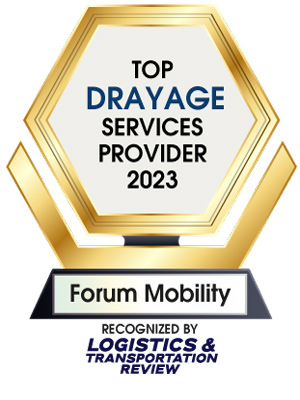THANK YOU FOR SUBSCRIBING
 Matt LeDucq, CEO
Matt LeDucq, CEOWhile the passenger EV industry continues to grow with charging station builders extending coverage, a lesser known yet crucial area of development is the establishment of EV charging stations specifically for trucks.
A company at the forefront of this transition is Forum Mobility, aiming to facilitate the shift to zero-emission drayage by building a network of heavy-duty charging depots designed specifically for the needs of the industry. These strategically located depots will be in and near significant ports, and along frequently traveled freight corridors, like South Los Angeles, the Inland Empire, and the Central Valley. This will enable fleets and independent owner-operators to adopt electric trucks while consistently meeting their operational requirements.
With California’s Air Resources Board (CARB) passing the Advanced Clean Fleet (ACF) regulation and mandating 100 percent zero emissions for drayage operations by 2035, it is becoming imperative for battery and fuel-cell EVs to enter the drayage space. However, the lack of existing charging infrastructure poses a significant barrier to EV transition. For fleets and drivers, building their own charging requires a long-term lease or ownership of property and a location on a utility distribution feeder with sufficient spare capacity – and that’s a challenge.
“Our network of charging depots will address this issue by offering a reliable and accessible charging solution to those without the resources to develop their own infrastructure. Each depot—capable of accommodating 25 to 150 trucks—will be staffed and secured overnight, ensuring vehicles are charged and ready for operation the following day,” says Matt LeDucq, CEO of, Forum Mobility. Forum offers customers a choice of services: a new electric truck and charging together, or just charging, each for a monthly fee. Forum Mobility’s one-stop electric truck solution makes it easy for fleets and drivers to make the transition.
The company’s first customer, Hight Logistics Inc., is already demonstrating the value of this approach. In this case, Forum was able to install chargers at the Long Beach-based firm’s facility. Hight pays a monthly fee for the charging and five electric trucks, which are in daily service at the ports of Long Beach and Los Angeles. This arrangement has enabled Hight to stay focused on its core business while meeting CARB’s compliance requirements. And the drivers really like the electric trucks, too.
-
The drayage industry must make a rapid transition to zero emission vehicles, and Forum Mobility’s one-stop charging, and electric truck solutions make it easy as possible for fleets and drivers
For many fleets and drivers, understanding the new regulations, and securing incentives for electric trucks and charging stations is challenging and time-consuming. Forum takes care of it all and passes on the savings to the client, ensuring they can adopt a sustainable business model following the transition to EVs.
Forum’s role in helping clients overcome process hurdles brings more benefits than just regulatory compliance. A rising tide of beneficial cargo owners (BCOs) is favoring carriers that offer a zero-emission solution. As more companies strive to meet sustainability goals and reduce their Scope 3 emissions, carriers that can provide a zero-emission solution are gaining a distinct competitive edge.
Forum’s first tranche of about eight depots spanning Northern and Southern California is set to be operational within the next 24 months. These facilities will accommodate around 600 trucks, marking a significant step forward in California’s zero-emissions goal.
These approaches are a testament to Forum’s mission to create a future where people and goods move freely and sustainably. “The drayage industry must make a rapid transition to zero-emission vehicles, and Forum Mobility’s one-stop charging, and electric truck solutions make it easy as possible for fleets and drivers,” concludes LeDucq.
| Share this Article: Tweet |
Company
Forum Mobility
Management
Matt LeDucq, CEO
Description
Forum Mobility is leading the way in the transition to zero-emission drayage with a network of heavy-duty charging depots strategically located near major ports and freight corridors. Its comprehensive solution addresses the lack of charging infrastructure, offering reliable access and handling incentives for the streamlined adoption of electric trucks.
Forum Mobility News
Forum Mobility Plans Drayage Truck Charging Depot at California Port









“Forum is building dedicated infrastructure for heavy-duty trucks to transition from diesel to electricity,” says Matt LeDucq, CEO and co-founder of Forum Mobility. “With the support of the Port of Long Beach, the FM Harbor depot will provide drayage truckers a turn-key solution to comply with California Air Resource Board regulations. At Forum Mobility facilities like this one, fleets can make the transition simply and without using their own capital. Forum is building a network of charging depots at the ports, along freight corridors and near distribution centers to serve owner-operators and carriers of all sizes.”
Talon Logistics Inc., a national drayage carrier based in Chino, Calif., has already secured dedicated charging at FM Harbor.
“Talon Logistics prides itself in being a trend-set leader, and Forum is our trusted infrastructure partner,” says Emmanuel Carrillo, Talon CEO. “Securing fully staffed and dedicated charging inside the port makes us pioneers in the space, which puts us ahead of the competition. FM Harbor couldn’t be more convenient — 7,000 trucks a day go into the Port of Long Beach, and our fleet will be one of the few able to charge right next to the terminals. Forum’s turnkey charging solution allows me to focus on growing my business and serving my customers.”
Forum’s Port of Long Beach depot will offer 19 dual-port 360 kW chargers and six 360 kW single-dispenser chargers, able to charge 44 trucks simultaneously, with the ability to charge an electric Class 8 truck in about 90 minutes, depending on battery size. The depot will be fully staffed and is scheduled to be online in autumn 2024. At full capacity, it will serve over 200 trucks a day.
The site is at 260 Pico Street, adjacent to the Long Beach Container Terminal. Elemental Excelerator provided supportive funding.
The first installment of eight charging depots, with capacity to charge about 600 trucks simultaneously, is scheduled to come online over the next 10-20 months. Forum provides one-stop solutions for drivers and fleets to easily transition to electric vehicles. Staffed and secured depots offer either access to charging services, or a truck plus charging together, for one monthly fee. The California Air Resources Board is requiring all of California’s drayage fleet — approximately 33,000 Class 8 trucks — to be zero-emission by 2035. The California Energy Commission estimates that to comply with the Advanced Clean Fleet and other regulations, California will need 157,000 medium- and heavy-duty chargers by 2030.